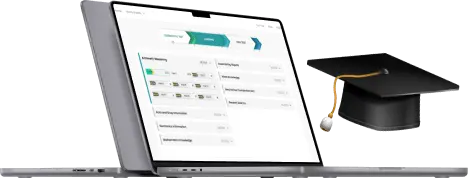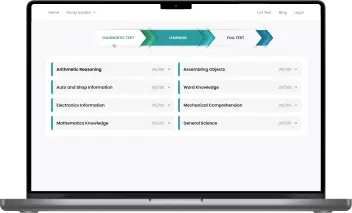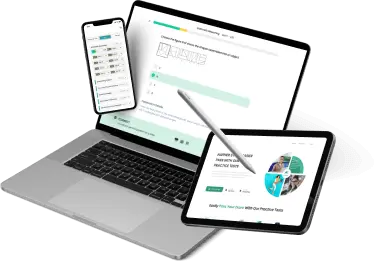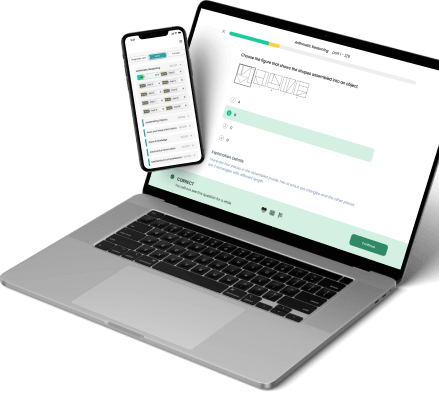Fun & effective TEAS practice test tool to pass with flying colors
All-in-one platform with everything you need to ace the TEAS on your first attempt
Clear and Thorough Learning Path
Proven TEAS 3-step Practice Formula
After our 100,000+ users' success stories, we developed a 3-step strategy to provide you with the most precise and in-depth learning path while minimizing your prep time.TEAS Diagnostic Test
First, take this short test and get your detailed report showing your strong and weak areas. Save your time by concentrating on what is in demand.Learning
With quick, bite-sized learning techniques and a detailed study guide for each TEAS section, you can really strengthen your weaknesses (from step 1) and boost your scores.TEAS Full Test
The last step for your preparation is taking our full TEAS practice tests and seeing how far you've come since the beginning. Repeat the 3-step formula until you are satisfied with your results!Ready to start?
Thousands of TEAS users already accomplished their goals.NOW it’s your turn!

What You Get

All-in-one platform
A complete TEAS Prep Platform, including a diagnostic test, detailed study guides for all topics, practice questions with step-by-step explanations, and various full simulator tests.
Questions nearly identical to those in the real TEAS test
All questions are categorized into the specific sections as on the real TEAS: Same format & same difficulty!
Best for the busy
Easily & quickly grasp all the knowledge with our unique learning technique. And you can learn anytime, anywhere on any devices, even with a few free minutes.
Practice while having fun
Learn and play! Complete round-by-round to reach your daily achievement and make progress on your learning journey!Featured on















What our users are saying
Over 50,000 aspiring American candidates use TEAS monthlyTEAS Test Comprehensive Guide [2024 Updated]
When considering attending a nursing school, you should be prepared to take the TEAS test, also known as the Test of Essential Academic Skills. The TEAS test is not required for all nursing school candidates. However, most nursing students and aspiring students need to be aware of what it is first.
This post will give you a comprehensive view of the TEAS test and how to prepare for it. You'll also learn about passing scores and additional TEAS questions.
What is TEAS Test?
Students interested in nursing in the United States are required to take the TEAS exam prior to submitting their applications to nursing schools. It evaluates a nursing student's prospects for academic success in nursing school. Because studies have shown that students who pass well on this exam also perform well academically in higher education, universities employ this test.
The TEAS is often a part of the comprehensive application process that nursing students are required in order to be considered for admission to nursing school. This process includes submitting transcripts, an application, an essay, letters of reference, and fees. An examination that is similar to the TEAS exam is called the HESI A2 test. This test is required by various educational institutions as part of the admission process for students. Even while passing the TEAS is not specifically required for admission into nursing school, you should nevertheless prepare for it beforehand in order to give yourself the best possible chance of being accepted.
ATI is responsible for managing the TEAS in addition to providing preparation services. You have the option of taking the TEAS either in person at your school, at an ATI testing center, or online with the assistance of a proctoring service that has been approved by either your institution or the ATI. There are some schools that will only accept TEAS tests in a certain format, while others will let you choose between taking the test in-person or online.
Before the test can be scored, ATI assigns a point value, or weight, to each individual question. You will be able to identify questions with varying degrees of difficulty throughout the test; however, you will not be able to determine how many points are associated with each question. A passing score is determined differently by each educational institution.
What's On the TEAS Test?
It is important to note that the four academic areas assessed are Reading, Mathematics, Science, and English and Language Usage, as previously stated. There are a certain amount of pre-test questions for each academic area.
Reading
The Reading component of the TEAS exam is broken down into three separate skills. Participants must be able to read passages and respond to questions regarding the content they have just read in order to pass this exam effectively. They'll need to know how to look for the major ideas and supporting elements in a paragraph. As part of the exam, students will be examined on their ability to comprehend the information and concepts offered in a text.
Mathematics
In addition to the pretest questions, the TEAS test's Mathematics component has two sub-content sections. Answers to inquiries regarding measurements and data in mathematics and algebra are expected. In the Number and Algebra part, there are many more questions aimed at testing applicants' fundamental arithmetic abilities. Participants will be tested on their ability to understand data and their familiarity with various measuring methods in the Measurement and Data portion.
Science
This component of the TEAS exam is separated into three skills, excluding the pretest questions. Students must answer more detailed questions on human anatomy and physiology as well as life and physical sciences sub-topics in this stage of the exam. The Scientific Reasoning sub-content area will also include some more broad science-related questions. The TEAS test is designed to see whether students are ready to attend a health science school, hence the Human Anatomy and Physiology section is heavily weighted. Human biology, chemistry, and other relevant disciplines are likely to be included in the exam.
English Language Usage
After the pretest, the TEAS test's English and Language Usage component includes three more curriculum areas. Candidates will need to have a more advanced command of the English language, just as they did for the Reading portion. It is important that candidates demonstrate their understanding of grammar and vocabulary in order to pass this exam. Test takers should review fundamental grammar and punctuation standards in order to succeed in this portion. In addition, they may choose to brush up on their vocabulary and get familiar with a variety of sentence forms.
Our TEAS practice tests
Free Practice Questions: 850+free TEAS practice questions with detailed explanations are available for all of the required skills. All you need to pass your recruitment test is available here.
TEAS Practice Tests Based On Real Tests: Same number of questions, same time limits, same structure. The exam simulators let you familiarize yourself with the test format and get totally ready for the real one.
No Sign-Up Or Login Required: All of your progress is saved without an account, even if you close your browser. But login can sync your data between web and mobile applications.
Gamification: The learning process will be divided into small milestones. Let’s make your studying exciting as if you were in some interesting games.
Personal Study Plan: Just enter your TEAS test date, and a study plan will be set up for you. A clear schedule will surely exceed your expectation and get you the best preparation for the reading shot.
3 Interesting Test Modes: 3 different test modes with increased difficulty levels let you experience the TEAS practice test in various ways.
Dark Mode: Experience a dark theme that is more friendly to your eyes, and get a whole new and marvelous experience.
No Internet Required: Study on the go conveniently without any Internet connection.
TEAS Test Bank: 3 features: Weak/ Medium/ Strong questions help you clearly determine which area you should pay more attention to.
TEAS Test Format (2 Version)
The four fundamental skill areas covered by the TEAS are arithmetic, reading, science, and English and language use. The TEAS test consists of four parts and is a multiple-choice examination. The whole test has a time restriction of 3 hours and 29 minutes (209 minutes) and 170 questions (150 of which are assessed).
There are 170 total questions in the format of both the ATI TEAS 6 and TEAS 7, 20 of which are utilized for internal testing and are not evaluated. The quantity of "internal testing" questions on the TEAS 7 hasn't been determined yet.
Kindly be informed that the TEAS 7 test will be made available in June 2024. You will very certainly be taking the TEAS 6 exam if you are taking the test before that time. There is no need to be concerned since the two tests' fundamental ideas are fairly similar. The amount of questions in each test part is where there is the most disparity.
Below are the two tables that illustrate clearly the format of both the TEAS 6 and TEAS 7 exam's structure.
ATI TEAS Test 6 Format
|
Section |
Time Limit |
Total Number of Questions |
|
Reading |
64 minutes |
53 questions |
|
Mathematics |
54 minutes |
36 questions |
|
Science |
63 minutes |
53 questions |
|
English and Language Usage |
28 minutes |
28 questions |
|
Totals |
209 Minutes |
170 Total Questions |
ATI TEAS Test 7 Format
|
Section |
Time Limit |
Number of Scored Questions |
|
Reading |
64 minutes |
39 questions |
|
Mathematics |
54 minutes |
34 questions |
|
Science |
63 minutes |
44 questions |
|
English and Language Usage |
28 minutes |
33 questions |
|
Totals |
209 Minutes |
150 Scored Questions |
TEAS Test Registration Process
TEAS Registration Requirements
The vast majority of students who sign up for the TEAS exam do so with the intention of subsequently enrolling in a health science program offered by a school of higher education. Before sitting for the TEAS exam, students may be required to finish certain requirements or courses, depending on the program that they are enrolled in. In most cases, students must fulfill these requirements before taking the exam.
Additionally, to be taken into consideration and advised for admission in the health sciences program at particular institutions/universities, the student must first finish a certain number of classes. There is a possibility that these classes will include core skills such as English, reading, mathematics, and science; however, the actual curriculum will vary.
Candidates have to further address their TEAS exam registration with the institution or university that they want to attend for a number of different reasons. These reasons include: These considerations may include the minimum required score to pass, the number of attempts that are permitted, and the registration deadlines. They should ascertain if they may take the test somewhere else, like an ATI testing facility, or whether they must take it on campus.
How to Register for the TEAS Test?
It is possible that test-takers will have a tough time figuring out how to register for the TEAS exam, especially if they are unsure of where they may get information. Candidates need to be aware that the admissions office of the school that they are interested in attending has the most up-to-date information on both the registration process and the actual test.
Follow the guidelines below carefully in order to avoid missing any crucial steps in the registration process for the TEAS if you are an exam taker who is prepared to take the test.
- Visit the ATI website and choose the "Register" link.
- Pick a testing strategy (in person or online)
- Select a program type (Nursing or Allied Health)
- Choose a test day and time.
- Review the data and, if required, add more transcripts.
- Review process
- In addition to confirmation information, check your email for important details that can help you succeed on the test.
It is essential to keep in mind that test-takers are given a testing transcript in addition to the TEAS when they register for the exam. Candidates will be required to pay a fee in order to get additional transcripts if they make the decision to have more than one.
Additionally, applicants should be aware that while most schools only permit three testing attempts each calendar year, it is always a good idea to double-check the policy with the admissions office. Additionally, it is often necessary to wait at least 30 days after passing the last test before retaking the TEAS.
TEAS Test Scores
How Are TEAS Test Scores Determined?
The results of the TEAS exam are broken down into three sections: the total score, the score for the content, and the sub-content score. A score is provided to each of these three categories based on the individual components that make up the category.
In addition, ATI, the organization responsible for administering the exam, makes use of this data in order to assign a level of academic readiness to the overall score. When evaluating a person's preparedness for participation in a health sciences program, several characteristics are taken into consideration.
The total score is determined by adding together the weights from each component of the examination, which are then averaged together. Your score will be determined by how well you answer the questions that pertain to each of the sub-content areas.
The Sub-Content Area scores include the subsections of the previous sections, such as the reading section's Key Ideas and Details and Craft and Structure, are included in the Sub-Content Area scores. These several subsections are included in each of the topic categories, and each is given a separate score.
Participants must be aware that the ATI will only give them points for the questions they properly answer. As a result, omitting more difficult questions may not be the greatest approach to acing the exam. Long-term improvement of the total score could result from providing as many answers as you can.
Receiving Your TEAS Test Score
You may choose to take the TEAS in either paper form or over the computer. Those who want to take the paper version of the exam will be required to wait for the results since ATI will be responsible for scoring it. Students who choose to take the computerized version of the exam, on the other hand, will have immediate access to their scores.
The bottom line is that test-takers who want to take the paper version will have to wait longer. TEAS results are sent to the preferred school once they are available.
What Is on Your TEAS Test Score Report?
On your report, you'll see 3 independent TEAS scores:
- Total score: This is the result of adding together all of the individual section scores.
- Content Area Score: These will be individual scores for each section of the TEAS test.
- Sub-Content Area Score: These are then broken down into subcategories, and each of these subcategories is given a score.
It is very important to note that the total score is not the same as the average of the four individual components. The final score is weighted and based on the individual's performance in each category.
TEAS Score Range
In addition to the scores that are allotted to the various components of the TEAS exam, test takers is also given an academic preparedness rating, which indicates whether or not they are ready to enroll in a program in the health sciences. The test-final taker's overall score on the examination is used as the basis for the assessments.
The table that follows presents a comparison of the test results and the ranking for academic preparedness.
|
Academic Levels |
TEAS Score Range |
|
Developmental |
0.0%-40.7% |
|
Basic |
40.7%-58.0% |
|
Proficient |
58.7%-79.3% |
|
Advanced |
80.0%-91.3% |
|
Exemplary |
92.0%-100% |
Test-takers and colleges might get a sense of how well they fared on the test by looking at their academic preparation levels. To learn more, people might look at the specifics of the score sections. For illustration, an examinee may see where their weaknesses lie by examining the Reading part of the exam. If they didn't reach the university's standards, the score report will assist them to identify particular performance gaps.
What Is Considered a Good TEAS Score?
It will differ from school to school what constitutes a passing score on the ATI TEAS VI test. For admission, some colleges have a minimum overall score. Other schools could have set minimum standards for each subject area. Some schools don't even have definite cutoff points. This implies that the program's admissions committee determines the exam's passing score, which might differ across institutions.
While some institutions aim for certain composite scores for each of the exam's topic areas, others require students to achieve a certain number on the TEAS test's Total Score. In order to learn more about the minimum passing scores, test takers can contact the admissions office of the institution they have selected.
Determining Average TEAS Score
The ATI, which is in charge of administering the TEAS examination, does not publish an average TEAS score since each nursing school is responsible for determining its own minimum standard for passing the exam.
Depending on the standards of each individual nursing school in the United States, the average score on the TEAS is 60%. In many schools, the minimum required score to pass depends on the admissions requirements and might vary anywhere from 65% to 75% This requirement is for those seeking enrollment in associate's and bachelor's degree programs.
TEAS Test Cost
In that case, how much does it set you back to take the TEAS test? At the time of checkout, the total amount that each candidate will be responsible for will vary depending on the institution that they attended, the number of transcripts that they have ordered, and any other fees or purchases that they have made via ATI. There is no one right answer to the question of how much the ATI TEAS exam costs since the cost differs for each individual who takes the test.
What is The Cost of Taking The TEAS Test?
The cost of taking the TEAS exam varies widely depending on the candidate's educational institution, the proctoring technique that they choose, and the particular testing facility that they use. The cost of taking a TEAS exam that is proctored by either ATI or PSI is $115. The majority of universities charge applicants something in the range of $100, despite the fact that the cost of examinations might vary significantly across institutions of higher education or testing centers.
Candidates who use ATI to sign up have the option of immediately paying their registration cost with either a credit or debit card. ATI accepts all major credit cards including American Express, Visa, MasterCard, and Discover.
For some candidates, the examination fee must be paid in person and the registration must be completed via the applicant's school. They are able to achieve this by selecting the "Add Product" option and then entering the Assessment ID number that was provided to them by their educational establishment. In addition to that, prospective candidates are required to pay using either a debit or credit card.
Before completing their purchase, all applicants should ensure that both the billing address and the delivery address that they provided are correct.
Additional TEAS Test Fees
There is a possibility that candidates may incur additional fees if they choose to take their exams at universities or have their exams proctored there. Some examples of possible additional expenditures associated with taking the TEAS exam include proctor fees, hotel fees, and scheduling fees. These will differ from one institution of higher education or testing center to another.
The price of the TEAS test includes a free transcript, and more transcript credits may be purchased for an additional fee of $27 each. These credits are never going to expire, but the fact that they cannot be refunded means that they may be given to the applicant once they have completed their exam.
Because TEAS examinations cannot be rescheduled or compensated, candidates who do not show up for their tests will be required to return the money they paid for them.
How Much Does It Cost to Retake the TEAS?
A second attempt will not incur any more fees than the first one did. Candidates who have already taken the ATI TEAS test are not eligible for any discounts or price reductions if they take it again. Candidates who retake the test with a distinct strategy the second time around may be required to pay a different fee than they did the first time around.
How Many Times Can You Take the TEAS Test?
Check with your institution before answering the question "Can You Take the TEAS Test More Than Once?" There is often a limit on how many times test takers are permitted to retake the TEAS exam in a calendar year in case they fail the TEAS on their first try.
The usual testing year allows students two to three opportunities to take the TEAS exam at their respective institutions. This limitation is often applicable to all TEAS assessments, whatever the location or manner in which the tests were conducted. Applicants who wish to retake one or more TEAS examinations to improve their scores must make appropriate preparations to comply with any requirements about the waiting time.
How Often Can You Take the TEAS Test?
The amount of time allowed between retakes of the TEAS test varies from institution to school. Before candidates are granted permission to repeat the TEAS exam, most educational institutions require them to wait a minimum of thirty days. Test takers have to meticulously prepare for a number of attempts if they want to comply with the school's policy that allows them to repeat the exam two or three times, depending on the circumstances.
It is strongly suggested that participants have a minimum of six weeks to prepare for the examination. In addition, it is strongly recommended that those who want to retake the TEAS do so at least a few days before their appointment to do so.
Additional TEAS Test Retake Rules
Other TEAS test retake restrictions include scheduling and the recording of retake attempts on the score transcript. These regulations are in addition to the number of retakes that are permitted yearly as well as the amount of time that must pass between retakes. It is not possible for test-takers to change their exam date once they have already scheduled it, regardless of whether they are taking the exam for the first time or a subsequent time.
As a consequence of this, candidates have to make certain that they are aware of any deadlines that they are required to meet. Participants in the TEAS exam should be advised that the number of attempts will be recorded on the official ATI TEAS transcript if they take the test more than once. This will allow institutions to see the number of attempts.
Test Centers for the TEAS Test
When taking the TEAS, candidates have a number of options, including whether to take it in person or online. The greatest source for information about TEAS test sites will be the program the individual plans to apply to. Candidates may also identify testing locations for the TEAS on the ATI website that are convenient for them.
Online (Proctored by ATI)
A candidate receives a lot of information when they register for the Online (proctored by ATI) TEAS exam to make sure there are no issues on the test day. On the ATI website, under this approach, they provide fast recommendations that applicants should be aware of before taking their tests, such as time allotment and details regarding their Admissions ID.
The website also advises that applicants should confirm their machine fits the technical criteria according to a list published by ATI before the test date. This list covers software that has to be activated or disabled as well as any special system requirements.
Additionally, ATI gives applicants the chance to practice for the exam in order to determine if their computer will be functional on test day. They also provide instructions on how to prepare for the exam day, such as making sure their computer is fully charged and starting the login procedure at least 30 minutes beforehand to be prepared when the test starts.
Online (Proctored by Institution)
Comparable to taking the ATI online test, taking the TEAS exam online via the university where one is seeking admittance. The whole testing session will be watched over by a proctor. This test may be taken at a computer lab at the university, from home, or from another remote location.
On both the ATI website and the institutional website, testing advice is given regarding best practices to make sure applicants are adequately equipped with the necessary tools to take the exam. This instruction explains how much time they should allow for the exam as well as how to set up their testing space so they can focus entirely on it.
In-Person (Proctored at Institution)
The program adviser should thoroughly explain the procedure to a candidate before they decide to take the TEAS test in person at their school to ensure they are well-prepared. Information on testing rules will be supplied, just as with the other techniques. This material will include a number of rules, such as what they may and may not bring to the testing location.
For the institution's in-person tests, test takers are advised to arrive at the testing location at least 15 minutes before the start of the exam to guarantee a smooth check-in process. Candidates must present a picture ID, which might be a piece of paper given by the government.
In-Person (Proctored by PSI)
Candidates must confirm that testing dates are accessible at the time they desire to take the TEAS exam before registering to take it in person at a PSI testing facility. The ATI testing site offers information regarding the exam, just as with the other ways. The registration procedure is simple and may be completed on the ATI testing website by applicants who want to take the exam at a PSI location.
The testing center's varied testing regulations and registration requirements should be carefully considered by test takers. Candidates should carefully examine the TEAS testing locations for the one they want to choose to make sure they are selecting the right site.
Above is our comprehensive guide relating to the ATI TEAS test. We strongly hope that this information can provide you with beneficial information for the purpose of acing this test. Good luck!






